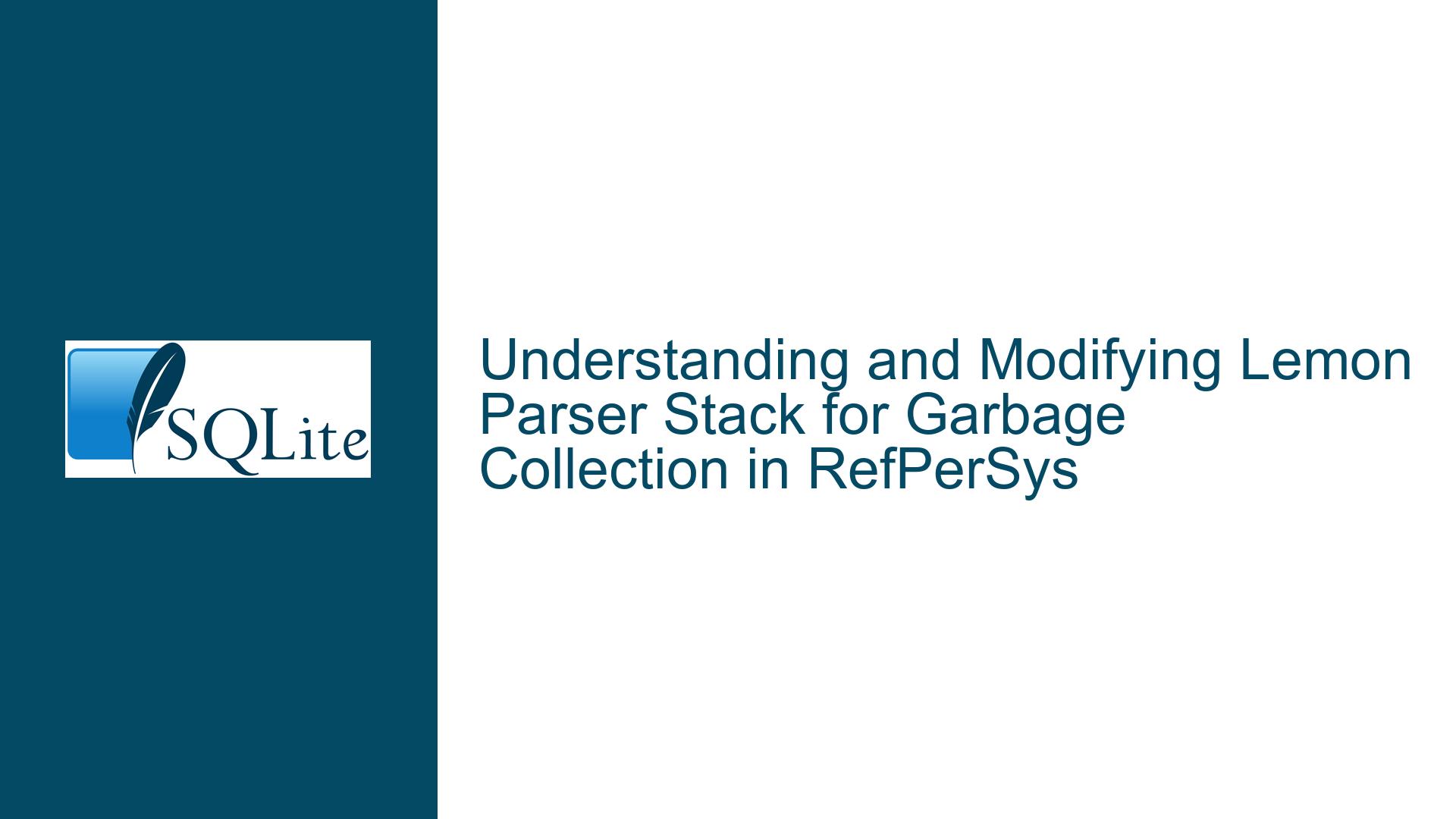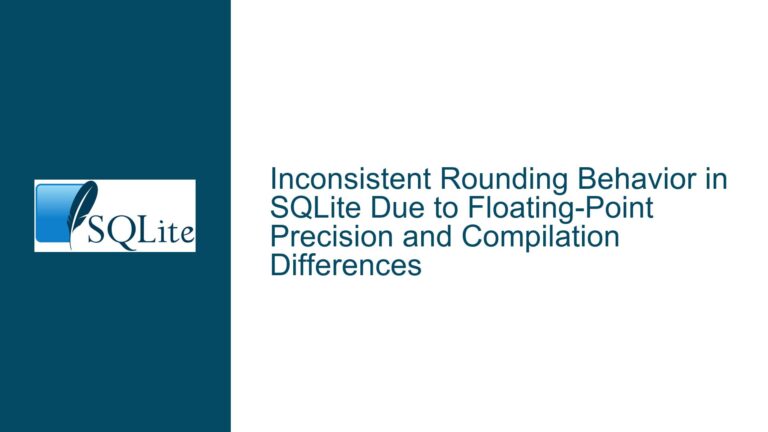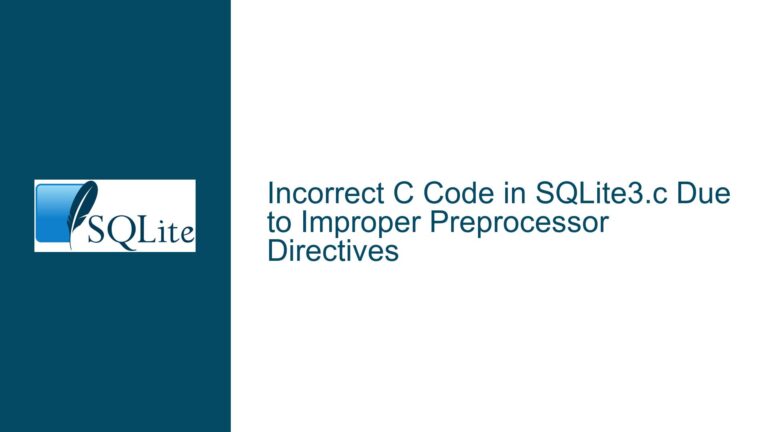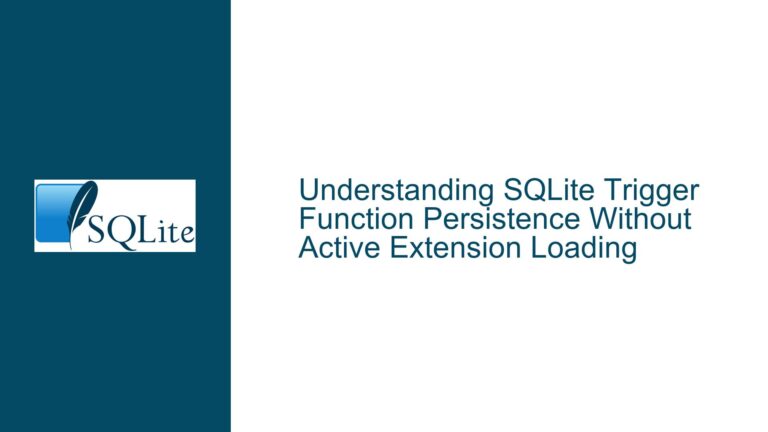and Modifying Lemon Parser Stack for Garbage Collection in RefPerSys
Issue Overview: Garbage Collection in Lemon Parser Stack for RefPerSys
The core issue revolves around integrating a precise moving copying/generational garbage collector into the Lemon-generated parser stack for the RefPerSys project. RefPerSys is an open-source inference engine that leverages C++ code generation and garbage collection inspired by the OCaml runtime. The challenge lies in ensuring that the garbage collector can correctly identify and manage memory allocations within the Lemon-generated parser stack, specifically focusing on the YYMINORTYPE union type and its Rps_Value branch, which is a void* pointer requiring garbage collection.
The Lemon parser generator produces a stack structure (yyStackEntry) that contains a union type (YYMINORTYPE). This union type has multiple branches, including Rps_Value, which is a pointer type that must be garbage collected. The primary concern is determining when the minor field of the yyStackEntry structure uses the Rps_Value branch of the union. This is critical for implementing the garbage collection routines, as the garbage collector needs to scan and mark the yystack entries correctly.
The yyStackEntry structure contains three fields: stateno, major, and minor. The stateno field represents the state number or reduce action, while the major field represents the major token value. The minor field is of type YYMINORTYPE, which is a union containing the Rps_Value branch. The challenge is to identify the conditions under which the minor field uses the Rps_Value branch, as this determines when the garbage collector should act on the stack entries.
The issue is further complicated by the fact that the Lemon parser generator does not inherently support garbage collection. Therefore, modifications to the Lemon skeleton file (lempar.c) or the generated parser code may be necessary to integrate the garbage collection routines. However, the goal is to avoid patching the lemon.c file itself, as this would make the solution less maintainable and harder to integrate with future updates to the Lemon parser generator.
Possible Causes: Ambiguity in Union Type Usage and Parser State Transitions
The primary cause of the issue is the ambiguity in how the YYMINORTYPE union is used within the Lemon-generated parser stack. The union type allows the minor field to hold different types of data, including Rps_Value, which is a void* pointer requiring garbage collection. However, the Lemon parser generator does not provide explicit mechanisms to determine which branch of the union is being used at any given time. This ambiguity makes it difficult to implement garbage collection routines that can correctly identify and manage the Rps_Value pointers.
The yyStackEntry structure’s stateno and major fields play a crucial role in determining the state of the parser and the type of token being processed. However, the relationship between these fields and the minor field’s union branches is not explicitly documented or enforced by the Lemon parser generator. This lack of clarity makes it challenging to predict when the minor field will use the Rps_Value branch, which is essential for garbage collection.
Another potential cause is the dynamic nature of the parser stack. The Lemon parser generator produces a stack-based parser, where the stack grows and shrinks dynamically as the parser processes input tokens. This dynamic behavior means that the minor field’s union branches can change frequently, depending on the parser’s current state and the type of tokens being processed. This variability further complicates the task of implementing garbage collection routines, as the garbage collector must be able to adapt to the changing state of the parser stack.
Additionally, the Lemon parser generator’s skeleton file (lempar.c) does not provide hooks or callbacks for integrating custom memory management routines, such as garbage collection. This limitation means that any garbage collection implementation must either modify the generated parser code or the skeleton file itself. Modifying the generated code is not ideal, as it would need to be repeated every time the parser is regenerated. Modifying the skeleton file is a more maintainable solution, but it requires a deep understanding of the Lemon parser generator’s internals.
Troubleshooting Steps, Solutions & Fixes: Implementing Garbage Collection in Lemon Parser Stack
To address the issue of garbage collection in the Lemon-generated parser stack, the following steps and solutions can be implemented:
Analyze the Parser State Transitions: The first step is to analyze the parser’s state transitions and determine the conditions under which the
minorfield uses theRps_Valuebranch of theYYMINORTYPEunion. This can be done by examining the Lemon grammar file and the generated parser code. Specifically, look for patterns in thestatenoandmajorfields that correlate with the use of theRps_Valuebranch. This analysis will help identify the specific states and token types that require garbage collection.Modify the Lemon Skeleton File: To integrate garbage collection routines, the Lemon skeleton file (
lempar.c) can be modified to include custom memory management functions. These functions should be designed to scan and mark theyystackentries, ensuring thatRps_Valuepointers are correctly identified and managed. The modifications should include hooks or callbacks that allow the garbage collector to interact with the parser stack during state transitions.Implement Garbage Collection Hooks: The modified skeleton file should include hooks that are triggered whenever the parser pushes or pops entries from the stack. These hooks should check the
minorfield’s union branch and invoke the garbage collector if theRps_Valuebranch is being used. This approach ensures that the garbage collector is only invoked when necessary, minimizing performance overhead.Use Conditional Compilation: To maintain compatibility with the original Lemon parser generator, conditional compilation can be used to include or exclude the garbage collection routines based on a preprocessor directive. This allows the same skeleton file to be used for both garbage-collected and non-garbage-collected parsers, depending on the project’s requirements.
Test and Validate the Implementation: After modifying the skeleton file and implementing the garbage collection hooks, the next step is to test and validate the implementation. This involves running the parser with a variety of input tokens and verifying that the garbage collector correctly identifies and manages
Rps_Valuepointers. Any issues or edge cases should be addressed by refining the garbage collection routines and the parser state transition logic.Document the Changes: Finally, it is essential to document the changes made to the Lemon skeleton file and the garbage collection implementation. This documentation should include details on how the garbage collector interacts with the parser stack, the conditions under which the
Rps_Valuebranch is used, and any modifications made to the Lemon grammar file. This documentation will be invaluable for future maintenance and updates to the RefPerSys project.
By following these steps, the issue of garbage collection in the Lemon-generated parser stack can be effectively addressed, ensuring that the RefPerSys project can leverage the benefits of precise moving copying/generational garbage collection while maintaining the integrity and performance of the parser.






